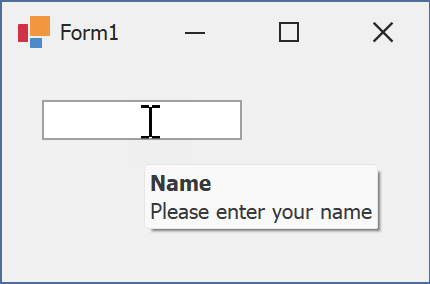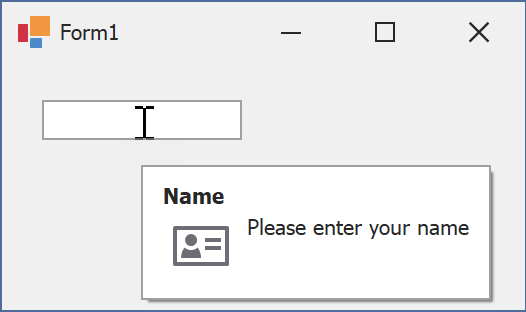TrackBarControl Class
Displays a scale with tick marks. Users can drag a thumb to change the current value.
Namespace: DevExpress.XtraEditors
Assembly: DevExpress.XtraEditors.v25.2.dll
NuGet Package: DevExpress.Win.Navigation
Declaration
[DXLicenseWinFormsEditors]
public class TrackBarControl :
BaseEdit,
IXtraResizableControl,
ISupportInitialize,
IGestureClientRemarks
The image below illustrates a Track Bar Control:

Main Settings
- Properties.Minimum and RepositoryItemTrackBar.Maximum - specify the value range.
- TrackBarControl.Value or TrackBarControl.EditValue - current value (thumb position).
- Properties.Orientation - allows you to choose between horizontal and vertical control orientations.
- Properties.InvertLayout - specifies whether the Step Bar arranges steps from left to right (a normal layout) or from right to left (an inverted layout). For vertical Track Bars, a normal layout is bottom-up, and an inverted step layout is top-down.
Value Progression Settings
- Properties.SmallChange - a small-increment increase or decrease in value. The control’s slider moves in small-increment steps when a user presses an arrow key.
- Properties.LargeChange - a large-increment increase or decrease in value. The control’s slider moves in large-increment steps when a user presses the Page Up or Page Down key.
- Properties.SmallChangeUseMode - specifies whether a user can spin the mouse wheel to change the control value by a small increment.
Manage the Control Value in Code
- Value - assign a value to this property to move the slider to a specific position.
- MoveBegin, MoveLeft, MoveLargeLeft, MoveLargeRight, MoveRight, MoveEnd - methods to gradually change the control value.
- TrackBarControl.ValueChanged and RepositoryItem.EditValueChanged - events that fire when a Track Bar value changes. The code sample below displays a warning message when a user increases the Track Bar value above eight.
private void TrackBarControl1_ValueChanged(object sender, EventArgs e) { TrackBarControl tbc = sender as TrackBarControl; if (tbc.OldEditValue != null && (int)tbc.OldEditValue < 8 && tbc.Value >= 8) XtraMessageBox.Show( "We reccomend that you keep this setting at Level 7 or less", "Warning"); }
Tickmarks and Labels
- Properties.TickStyle - specifies whether a control should display tickmarks on both sides of a scale, on one side only, or hide them completely.
- Properties.TickFrequency - the distance between adjacent tickmarks.
- Properties.ShowLabels - gets or sets whether a control shows labels next to tickmarks. Default labels are value numbers (1, 2, 3, etc.). You can edit the Labels collection to replace them with custom strings.
Tooltips
DevExpress controls support regular and super tooltips. Enable the ShowToolTips option to display tooltips when the mouse pointer hovers over the control.
Customize Regular Tooltip Text
Use the following properties of the target control to specify regular tooltip text and title:
API | Description |
|---|---|
Specifies tooltip text. You can use line breaks in regular tooltips. | |
Specifies whether to parse HTML tags in text. | |
Specifies the tooltip title. If you do not specify tooltip text, the tooltip is not displayed even if you specify the title. |
The following code snippet specifies tooltip text and title for a TextEdit editor:
public Form1() {
InitializeComponent();
textEdit1.ShowToolTips = true;
textEdit1.ToolTipTitle = "Name";
textEdit1.ToolTip = "Please enter your name";
}

Assign an Image to Regular Tooltips
Use the control’s ToolTipIconType property to assign a predefined icon. The ToolTipController.IconSize property specifies icon size.
Assign a custom image as follows:
- Create a ToolTipController and assign it to the control’s ToolTipController property.
- Create an image collection and assign it to the ToolTipController.ImageList property.
- Handle the ToolTipController.BeforeShow event. Use the e.ImageOptions parameter to assign a raster or vector image to the tooltip.
Note
The ToolTipIconType property has priority over e.ImageOptions. If you assign a custom image, set ToolTipIconType to None.
The following code snippet assigns a custom image to the TextEdit tooltip:
Note
textEdit1, toolTipController1, and svgImageCollection1 were created at runtime.
public Form1() {
InitializeComponent();
textEdit1.ShowToolTips = true;
textEdit1.ToolTipTitle = "Name";
textEdit1.ToolTip = "Please enter your name";
textEdit1.ToolTipController = toolTipController1;
toolTipController1.ImageList = svgImageCollection1;
toolTipController1.BeforeShow += ToolTipController1_BeforeShow;
}
private void ToolTipController1_BeforeShow(object sender, ToolTipControllerShowEventArgs e) {
ToolTipController controller = sender as ToolTipController;
if (e.ToolTip == textEdit1.ToolTip)
e.ImageOptions.SvgImage = (controller.ImageList as SvgImageCollection)["personalCard"];
}

Display a Super Tooltip
Use the control’s SuperTip property to assign a super tooltip. If you wish to use HTML tags in a super tooltip, enable the SuperToolTip.AllowHtmlText property.
Setting the ToolTipController.ToolTipType property to SuperTip converts existing regular tooltips to super tooltips.

Tip
Read the following help topic for information on how to customize super tooltips: Hints and Tooltips.